
On the path of life we walk, stagger, jog or roll—as animated organisms: 99% oxygen, carbon, hydrogen, nitrogen, calcium, and phosphorus (who may or may not enjoy the song “Girls Just Want To Have Fun”)—we are called upon to take action or not to take action.

We must make yes and no decisions the results of which determine how we live, think, feel and behave individually and collectively as a species.
Like a crow on a fence post we see it all from the vantage point of a media centre on top of our neck and shoulders.
If you say yes and take action—with luck, work, will and strategy—goals can be realized. If you say no and take no action, you let life happen without your will intruding. It’s hard to know which is better.

In our yes and no, action or no action decision, we may feel self-directed, but much is predetermined by systems, society and environment—not to mention: technology, luck, ability and proclivity—your “inclination or predisposition toward a particular thing.”
From ‘in here‘—alone as we are with our thoughts inside a skull walled-off by skin—it’s only natural to feel separate and set apart from a world that appears to us as ‘out there.’

But however real this feeling of being separate from the world is, scientifically speaking, it’s only skin deep and mental. We know we can’t be separated from this world—not without air, water and Twinkies!
Cue Boney M. “Rasputin” (for no apparent reason).
 We know living things are made up of cells and a cell is a “protein-based robot too small to feel or experience anything” but do we know that even though cells have the properties of life—they eat, grow, react and reproduce—no part of a cell is actually alive?
We know living things are made up of cells and a cell is a “protein-based robot too small to feel or experience anything” but do we know that even though cells have the properties of life—they eat, grow, react and reproduce—no part of a cell is actually alive?
The cells that comprise us are composed of dead matter animated by chemistry and moved by the laws of the universe. We’re like zombies except with a more varied diet and higher aspirations (hopefully).

Technically speaking, “Stuff reacts chemically with other stuff forming reactions that start other reactions which start other reactions,” until we draw this conclusion:
“One thing is for sure, the idea that life is fundamentally different for non-living things because they contain some non-physical element or are governed by different principles than inanimate objects, turns out to be wrong” (source: “What is Life?…”).
Our body changes but awareness of our self remains consistent:
“It’s like having an old wooden boat. You may have repaired it hundreds of times over the years, replacing wood chip after wood chip, until one day, you realize that not one piece of material from the original boat is still part of it. So is that still your boat? …
In this way, what you are is not really a thing as much as a story, or a progression, or one particular theme of person. You’re a bit like a room with a bunch of things in it—some old, some new, some you’re aware of, some you aren’t—but the room is always changing, never exactly the same from week to week” (“What Makes You You?”).

You are an ever-shifting mass of thoughts, feelings and perceptions but you feel a sense of continuity. You can look at a picture of yourself as a child and know that was you.
With an understanding of yourself as a story, personal hurt is reduced—how can you, as a “theme of person,” take it personal?—and selfless action is increased because you see yourself not as the egotistical pinnacle but as inseparable and integral (like a beaver).

Unless you’re in the “Experience Machine”—a machine that generates happiness in your brain as you float in sense depravation—reality is as it is and it couldn’t be otherwise. What is couldn’t be any more different than what ‘was’ could be altered. Accept what is and was and work toward what will be.

This feeling of being separate from nature comes from our ability to manipulate and disconnect at will. To understand, try this thought experiment:
Imagine you are walking in a park. As you breathe in trees, feeling movement and a soft breeze, you come to a roundabout with a botanical circle in the centre like the one pictured above and you must decide whether to go around or over.
If you go around, you conform to civic expectation, park design and gardener preference. You flow like water around the obstacle in acceptance of the extra distance. If you go over (or through), you do not conform to civic expectation. You take a logical short-cut that feels natural to save yourself time and energy.

This is not to judge one or the other—around or over—as better, but to show how thoughts are powerful. They direct you and take you. What you think can become reality. If you realize that all things change, you won’t try to hold onto anything. Go back to innocence and live spontaneously with your senses.
If you think “I am weak” or “I am going nowhere,” so be it! Your wish is granted. If you say, “I am the Greatest!” (like Muhammad Ali), “I am strong” or “I enjoy life!”—So be it. Again your wish is granted! Assertions we live by are reflected in life experience.

Extend yourself in what you see. Detach from a self that is separate. Flow like water—natural, gentle, aware of yourself in the big picture—enjoying a finite story that is selfless in a universe that is endless.
Enjoy it.













 Life stretches ahead as the past falls away (see: “
Life stretches ahead as the past falls away (see: “ Things happen. Like Sid Vicious, Sinatra and Elvis, we too sing, “Regrets, I’ve had a few; but then again, too few to mention. I did what I had to do. And saw it through without exemption” (“
Things happen. Like Sid Vicious, Sinatra and Elvis, we too sing, “Regrets, I’ve had a few; but then again, too few to mention. I did what I had to do. And saw it through without exemption” (“

 We know we should give more weight to promoting social welfare than to achieving personal gain but what’s more important, you or society? Here we come to the crux of the matter. A body with a brain is a person, but is there more to a self?
We know we should give more weight to promoting social welfare than to achieving personal gain but what’s more important, you or society? Here we come to the crux of the matter. A body with a brain is a person, but is there more to a self? There’s a war going on. It’s been going on for a couple of thousand years. It’s happening right now. It’s on TV, in the news and in books and movies. It’s on the Internet and on billboards but it isn’t an obvious war. It’s subtle. There are no bombs as a rule.
There’s a war going on. It’s been going on for a couple of thousand years. It’s happening right now. It’s on TV, in the news and in books and movies. It’s on the Internet and on billboards but it isn’t an obvious war. It’s subtle. There are no bombs as a rule. Like The Troggs said, “It’s written on the wind. It’s everywhere I go” (“
Like The Troggs said, “It’s written on the wind. It’s everywhere I go” (“ The philosopher Michel Onfray—resident hedonist, atheist, and anarchist—says that it’s a war between materialists and idealists (
The philosopher Michel Onfray—resident hedonist, atheist, and anarchist—says that it’s a war between materialists and idealists ( Imagine holding a spoon. You see it. You feel its weight and cool metal in your hand. These perceptions happen within your brain where data from sensory organs comes together and forms an “image” of the spoon in your brain, but apart from your perceptions and awareness of the spoon, is there really something outside and separate from your mind? Do you regard the spoon as real or not?
Imagine holding a spoon. You see it. You feel its weight and cool metal in your hand. These perceptions happen within your brain where data from sensory organs comes together and forms an “image” of the spoon in your brain, but apart from your perceptions and awareness of the spoon, is there really something outside and separate from your mind? Do you regard the spoon as real or not?





 In
In  In the article “
In the article “




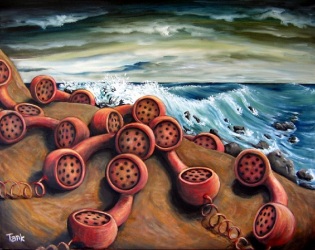 It’s a question we might ask our self on occasion. There’s a lot we should do but don’t. Why is that? Maybe it’s because we’re human and being human isn’t easy. We know where we’re headed. As Sigmund Freud said, “Everyone owes nature a death.”
It’s a question we might ask our self on occasion. There’s a lot we should do but don’t. Why is that? Maybe it’s because we’re human and being human isn’t easy. We know where we’re headed. As Sigmund Freud said, “Everyone owes nature a death.”
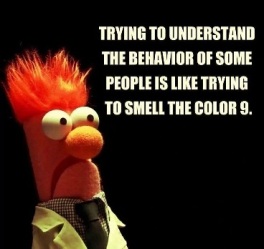 Stuck between finite awareness and infinite imagining and longing, everyone wants to enjoy themselves, but feeling ethically responsible in our ever expanding human ant hill can get in the way of enjoying.
Stuck between finite awareness and infinite imagining and longing, everyone wants to enjoy themselves, but feeling ethically responsible in our ever expanding human ant hill can get in the way of enjoying.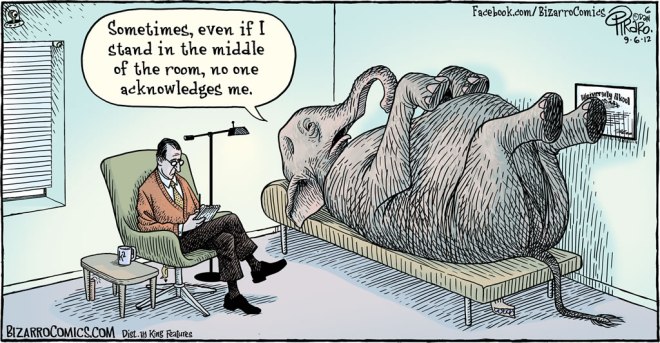
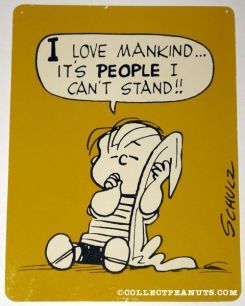 The human race as a whole has replaced the role of God and fate. This has encouraged a standard of morality that doesn’t rise higher than the goal of the greatest happiness for the greatest number.
The human race as a whole has replaced the role of God and fate. This has encouraged a standard of morality that doesn’t rise higher than the goal of the greatest happiness for the greatest number.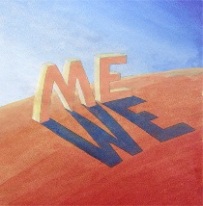 We’re encouraged to go from a selfishly materialistic “me generation” into a “we generation” where we celebrate differences at the same time we level everyone in the mania of a carefully orchestrated “We Day” pep rally for social change (see:
We’re encouraged to go from a selfishly materialistic “me generation” into a “we generation” where we celebrate differences at the same time we level everyone in the mania of a carefully orchestrated “We Day” pep rally for social change (see: 
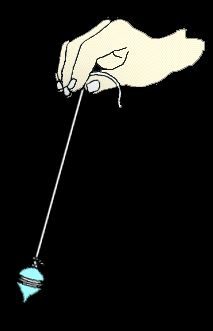 Both “me” and “we” perspectives seem oblivious of transcending their pronoun. Do you put yourself first or the group? Some might say, “That depends.” Sigmund Freud (1856-1939) observed, “In the depths of my heart I can’t help being convinced that my dear fellow-men, with a few exceptions, are worthless.”
Both “me” and “we” perspectives seem oblivious of transcending their pronoun. Do you put yourself first or the group? Some might say, “That depends.” Sigmund Freud (1856-1939) observed, “In the depths of my heart I can’t help being convinced that my dear fellow-men, with a few exceptions, are worthless.” People know you by what you do but how do you identify yourself? Your self is your will and your lack of will. Your will pulls you together into a coherent whole complete with muscular tension.
People know you by what you do but how do you identify yourself? Your self is your will and your lack of will. Your will pulls you together into a coherent whole complete with muscular tension.

 The sky rumbles and ruminates upon your fate as you stand bewildered. A thundering song rocks your brain: “I was caught in the middle of a railroad track (thunder!). I looked round and I knew there was no turning back (thunder!)” (“
The sky rumbles and ruminates upon your fate as you stand bewildered. A thundering song rocks your brain: “I was caught in the middle of a railroad track (thunder!). I looked round and I knew there was no turning back (thunder!)” (“

 We trick ourselves into thinking there must be a watcher for something to be watched, that what happens now follows the past, but it’s the other way round: the past follows from what’s happening now.
We trick ourselves into thinking there must be a watcher for something to be watched, that what happens now follows the past, but it’s the other way round: the past follows from what’s happening now.


 It’s time to pay attention to matters of love and friendship and textured vests. It’s a time to want what you get and be thankful for it. It’s a time to enjoy being mild and to smile for no apparent reason. It’s time to relax your face muscles completely, to not be critical of the idiot next door or find fault with yourself and all the others out there.
It’s time to pay attention to matters of love and friendship and textured vests. It’s a time to want what you get and be thankful for it. It’s a time to enjoy being mild and to smile for no apparent reason. It’s time to relax your face muscles completely, to not be critical of the idiot next door or find fault with yourself and all the others out there.
 Christmas is a time to enjoy seeing, hearing, smelling, tasting, touching, imagining (and caroling). It’s a time to be in time (not on time).
Christmas is a time to enjoy seeing, hearing, smelling, tasting, touching, imagining (and caroling). It’s a time to be in time (not on time). If you get sucked into the vortex of thinking, take a deep breath and start again. Gaze at Christmas ornaments unabashedly wide-eyed. Listen to music of love like it’s as essential as the air that you breath. Watch thought bubbles come and go and you will feel lighthearted love for all.
If you get sucked into the vortex of thinking, take a deep breath and start again. Gaze at Christmas ornaments unabashedly wide-eyed. Listen to music of love like it’s as essential as the air that you breath. Watch thought bubbles come and go and you will feel lighthearted love for all. Not that thinking is bad (unless it is bad thinking). It’s just that being perpetually absorbed takes you into a mental world that isn’t real. Before his transformation Scrooge was in a mental world where only money mattered. He was blind to the world outside his mind. But you don’t need ghosts to tell you what is.
Not that thinking is bad (unless it is bad thinking). It’s just that being perpetually absorbed takes you into a mental world that isn’t real. Before his transformation Scrooge was in a mental world where only money mattered. He was blind to the world outside his mind. But you don’t need ghosts to tell you what is. Look at Christmas tree balls. No sorrow. No lamenting. No coveting. No grief. Feel a passion for what is real in every moment, undistracted and accepting.
Look at Christmas tree balls. No sorrow. No lamenting. No coveting. No grief. Feel a passion for what is real in every moment, undistracted and accepting.
 The trick to all this is to ignore how the media presents Christmas perfection. Christmas is not perfect. Be with what is and remember the kid that you were.
The trick to all this is to ignore how the media presents Christmas perfection. Christmas is not perfect. Be with what is and remember the kid that you were. As much as we may ponder the past and worry about the future, Christmas is time to focus on now.
As much as we may ponder the past and worry about the future, Christmas is time to focus on now.
 While he was scuba diving Black probably did lose his mind, not to madness, but to a beautiful feeling when there’s nothing in it but the beauty of being in the beauty of what’s all around. When inner talk runs between wanting and not-wanting, and liking and disliking is stopped—particularly in a natural setting—we can feel aware of beauty in the outside world and enjoy it like nothing else.
While he was scuba diving Black probably did lose his mind, not to madness, but to a beautiful feeling when there’s nothing in it but the beauty of being in the beauty of what’s all around. When inner talk runs between wanting and not-wanting, and liking and disliking is stopped—particularly in a natural setting—we can feel aware of beauty in the outside world and enjoy it like nothing else. 

 Enjoyment can be conscious – as in, you consciously choose to read this – or unconscious – as in, you feel something without knowing why.
Enjoyment can be conscious – as in, you consciously choose to read this – or unconscious – as in, you feel something without knowing why.

 When you enjoy, you become as a poet.
When you enjoy, you become as a poet.



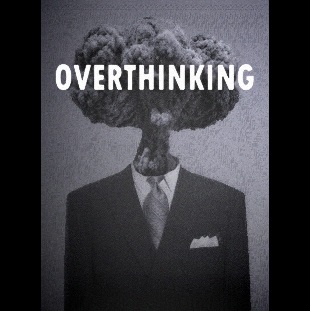 You see, it’s because of our brains. We either over-think and make it complicated, we under-think and act on insane urges or we multi-task and miss everything.
You see, it’s because of our brains. We either over-think and make it complicated, we under-think and act on insane urges or we multi-task and miss everything.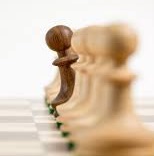 Our brains send messages. Sometimes these messages are destructive—ask anyone in therapy, rehab, prison or who is about to blow himself up. Not only do we deceive ourselves, other people trick us with their deceptions and w can become like pawns in the game of life, sacrificed for someone else’s idea of enjoyment.
Our brains send messages. Sometimes these messages are destructive—ask anyone in therapy, rehab, prison or who is about to blow himself up. Not only do we deceive ourselves, other people trick us with their deceptions and w can become like pawns in the game of life, sacrificed for someone else’s idea of enjoyment. Picture brain messages symbolically like they do in cartoons with a devil-you and an angel-you on each shoulder arguing their case for you to decide (see
Picture brain messages symbolically like they do in cartoons with a devil-you and an angel-you on each shoulder arguing their case for you to decide (see  On one side are symbols of light, innocence and wholesomeness (sappy?) and on the other, just the opposite (exciting?). In the battle between it comes down to focus. What do you choose to enjoy?
On one side are symbols of light, innocence and wholesomeness (sappy?) and on the other, just the opposite (exciting?). In the battle between it comes down to focus. What do you choose to enjoy? Do you take the gentle path of life as represented in Wordsworth’s poem, “I wandered lonely as a cloud; That floats on high o’er vales and hills; When all at once I saw a crowd; A host, of golden daffodils“? Or is that boring? “
Do you take the gentle path of life as represented in Wordsworth’s poem, “I wandered lonely as a cloud; That floats on high o’er vales and hills; When all at once I saw a crowd; A host, of golden daffodils“? Or is that boring? “ Do you prefer your entertainment on the excitingly evil side? How about delightful depravity and edgy cruelty that’s funny too? What’s your pleasure? Do you choose a quiet read, a walk in the park, a pint with a friend, or ‘gorified’ death in a Zombie Apocalypse?
Do you prefer your entertainment on the excitingly evil side? How about delightful depravity and edgy cruelty that’s funny too? What’s your pleasure? Do you choose a quiet read, a walk in the park, a pint with a friend, or ‘gorified’ death in a Zombie Apocalypse? Wholesome isn’t a word used much these days. It alludes to marketing all-natural breakfast cereals and family values but back in the year 1200 wholesome meant “of benefit to the soul.” It comes from the word “whole” meaning “healthy” (undamaged, entire, safe) and “-some” meaning “tending to” (
Wholesome isn’t a word used much these days. It alludes to marketing all-natural breakfast cereals and family values but back in the year 1200 wholesome meant “of benefit to the soul.” It comes from the word “whole” meaning “healthy” (undamaged, entire, safe) and “-some” meaning “tending to” (



 Self-help is defined as, “the use of one’s own efforts and resources to achieve things without relying on others” (Google).
Self-help is defined as, “the use of one’s own efforts and resources to achieve things without relying on others” (Google). It’s obvious: Each is unique. You are you. Bieber is the Biebs and Beethoven only looks constipated.
It’s obvious: Each is unique. You are you. Bieber is the Biebs and Beethoven only looks constipated. People have a mania for comparing and under or over rating each other. We’re opinion machines.
People have a mania for comparing and under or over rating each other. We’re opinion machines. This has nothing to do with your self. It’s not about you. That is, the thing to do is to forget yourself. Enjoy all you see, hear and feel. No ego. No win. No lose. No success. Be as 24 hour radio: All humility! All the time!
This has nothing to do with your self. It’s not about you. That is, the thing to do is to forget yourself. Enjoy all you see, hear and feel. No ego. No win. No lose. No success. Be as 24 hour radio: All humility! All the time!

 Research psychiatrist and neuroplasticity – conscious use of directed thoughts – expert, Jeffrey Schwartz says, “You Are Not Your Brain.” He explains that the mind or, “directed attention,” changes how the brain sends messages.
Research psychiatrist and neuroplasticity – conscious use of directed thoughts – expert, Jeffrey Schwartz says, “You Are Not Your Brain.” He explains that the mind or, “directed attention,” changes how the brain sends messages.
 It’s not that we want to stop firing, it’s that we want things firing to help us enjoy. The trick to beautiful enjoyments is to realize that what your brain is doing isn’t you, as in: “Excuse me. That wasn’t me. It was my brain.” Schwartz calls this your “true self” or “wise advocate. You can change your brain effectively through “wise focus of attention.”
It’s not that we want to stop firing, it’s that we want things firing to help us enjoy. The trick to beautiful enjoyments is to realize that what your brain is doing isn’t you, as in: “Excuse me. That wasn’t me. It was my brain.” Schwartz calls this your “true self” or “wise advocate. You can change your brain effectively through “wise focus of attention.” A poet of enjoyment lives in song.
A poet of enjoyment lives in song.